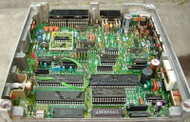Your car won’t start. Is your ECU to blame?
Posted by ECU Decode on 21st Dec 2020
In every vehicle, there is an ECU or Engine Control Unit. It is an electronic component with its own computer and your vehicle relies on this system to manage a variety of other functions. If your car won’t start it could be the ECU that’s to blame because the engine and drivetrain are dependent on a fully operational ECU. The combination of chips, components and electronic sensors, allows the vehicle to communicate, sending information between the engine and the ECU. This data will determine what function the car carries out and it will work out how much fuel the car needs and how to run the car in the most efficient way.
An ECU will play some part in every system in your vehicle which is sometimes why the ECU could be to blame if your car fails to start. There are five main problems that could be a result of the car’s ECU system.
Flat Battery – A car battery will include a series of electronic cells which need to work for the ECU to function properly. If any of the cells in the battery are flat, the ECU will fail. Once all the cells are flat, the car won’t work either.
Corrosion – Around the ECU there are seals which are there to stop moisture from getting into the ECU system. With the general wear and tear associated with running a car, these seals can become thin and moisture can leak inside if the seals become too worn. When moisture comes into contact with the ECU, the components will start to corrode. Over time, these components will stop working resulting in an ECU that malfunctions and a car that won’t start.
Jump-Starting – When a car won’t start you may consider a jump start. If a jump start is needed, the cables should always be securely attached. If they are not it could short out the ECU because it spikes too fast. This may result in having the ECU repaired or in the worst case completely replaced.
Starting – Most modern vehicles will feature sensors on the starters. One of these sensors will be an override which can monitor how many volts that is sent to the ECU. If the sensor was to fail in some way, the ECU wouldn’t receive the correct amount of volts and it could cause the ECU to malfunction resulting in problems with the vehicle.
That said if your car won’t start it isn’t always the ECU, so it is advisable to have your car checked by a qualified mechanic.



